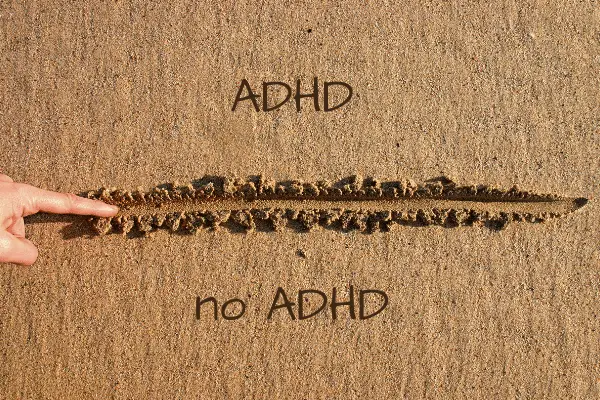Ever been told ‘You’re too emotional!’ and wondered why other people don’t seem to be bothered the way you are?
Well it turns out some people are more emotional, more sensitive. And while being sensitive can let you appreciate beauty more deeply, it means you also feel pain more acutely too.
The medical term is ‘Deficient Emotional Self Regulation’ which experts argue should be considered a core feature of ADHD.
Most adults with ADHD agree. It’s not the distraction or racing thoughts that bother them the most. Their hyperactive emotions are the worst aspect of having ADHD.
What is DESR, Deficient Emotional Self Regulation?
Deficient Emotional Self Regulation is a new term for having difficulty in regulating emotions. A person with DESR has appropriate emotions but the intensity of their emotions is considered to be out of proportion for the situation. ADHD experts believe that DESR should be considered a core feature of ADHD, along with inattention and hyperactivity/impulsivity.
Other terms for Deficient Emotional Self Regulation include: emotional dysregulation, poor emotional inhibition, emotional impulsiveness, emotional lability, emotional hyperactivity, or emotional reactivity.

ADHD expert Dr. Russell Barkley, proposed the term ‘Deficient Emotional Self Regulation’ in 2015.
Dr. Barkley and other ADHD experts have always described emotional lability and reactivity as a feature of ADHD. It is also believed to be a part of living with autism.
ADHD and Emotional Regulation: Not a New Idea
Emotions have always been part of ADHD. (And also part of Variable Attention Stimulus Trait, a term for having ADHD traits that do not meet the DSM ADHD criteria.)

According Dr. Barkley, a foremost ADHD expert, ADHD research used to include emotional dysregulation. ‘Every major paper …back in the 60s and 70s, all included emotional impulsiveness’.
Dr. Barkley says ‘It is as much a core feature of this disorder as any other symptom in the DSM’. ‘And it needs to be returned to our understanding of ADHD’.
Experts have been fighting to get emotional dysregulation added to the DSM criteria for ADHD.
Apparently part of the reason that the DSM criteria only include inattention or hyperactivity/impulsivity was because they are easier to observe for medical studies of ADHD. These symptoms are easier to quantify than emotions.

Unfortunately this resulted in the fact that emotions are a major part of ADHD not being understood or taught. Which as we will see is a big problem.
However in Europe emotional dysregulation has become a fourth core feature of ADHD. The four features of ADHD in Europe are: distractibility, impulsivity, hyperactivity/hyperarousal and emotional dysregulation.
Dr. Amen of the Amen Clinic has incorporated emotions into his understanding of ADHD. Dr. Amen Classifies ADHD into 7 Types, with one type being very emotional and called Limbic ADHD, and the most intense form being Ring of Fire ADHD.
What does DESR look like?
Deficient Emotional Self-Regulation can look like:
- Always being irritated
- ‘Flying off the handle’
- Quickness to anger
- Being easily excitable
- Low frustration tolerance

- Feeling rage
- Displaying your emotions much more quickly than others.
- Being considered a ‘basket case‘
- Having your opinion dismissed
- Not being able to advocate for yourself

- Being taken advantage of
- Anxiety
- Depression
- Impaired judgement
DESR is Emotional Dysregulation
I’m not a huge fan of the term DESR to be honest. ‘Deficient Emotional Self Regulation’ focuses on the negative side of having big emotions.
I prefer the term emotional lability or hyperactivity. They are more neutral and hyperactivity fits in how ADHD is currently understood.
We all are taught that ADHD means hyperactivity. And we picture physical hyperactivity, a little kid running around disrupting the class.

But what we are talking about with DESR is emotional hyperactivity.
(Read more about how the hyperactivity of ADHD has 3 sides: physical, mental and emotional.)
So with Deficient Emotional Self-Regulation the emotion is normal for the situation. But the are more intense than you would expect.
They are Hyperactive or Labile Emotions.

Why are you are so emotional?
Because you feel things more strongly, you are literally wired that way. For good, and for bad.
Emotional hyperactivity can be great. Being moved by a piece of music in a way others are not. To feel so strongly about a cause that you dedicate years of your life to it.

You get so excited that your enthusiasm can be infectious. People love your energy and you can inspire others.
Everyone talks about how they want to find their passion. Well if you’ve got DESR, you can usually find your passion easily enough!
When well channeled, emotional hyperactivity can be an asset. It seems to be part of the link between adult ADHD and entrepreneurship.

But there is the other side.
The anger, the irritation, the inability to stay calm when frustrated.
Getting upset and not being able to think straight. And then doing or saying things that are not in your best interest.

DESR, Emotional Impulsivity or Reactivity
Another way to look at Deficient Emotional Self-Regulation is as emotional impulsivity.
Impulsivity is another core feature of ADHD, but again they are looking at physical impulsivity. Here are some ADHD diagnostic criteria: Not being able to wait your turn, blurting out answers, talking too much.
But this ‘physical impulsivity’ is also based on emotions. Our emotions and actions are intertwined.
What does emotional impulsivity look like?
Having your ‘heart on your sleeve‘. Showing your emotions more quickly than others.

Not being able to hold yourself back. Lacking inhibition.
Getting excited about a new hobby and buying all the supplies needed. Making emotional impulse purchases.

While others can moderate their emotions and pause, we show our emotions more quickly than others.
Without this ability to stop and calm ourselves, we can end acting in a socially unacceptable way.

Even though we may be correct in an argument we cannot get our opinion across effectively. We blurt things out and offend people. We can turn a bad situation to worse.
And once you have offended someone, they may no longer value your opinion. They might even go out of their way to prove you wrong.
DESR Causes: Genetics and Modelled Behaviour
ADHD has 80% heritability, so Deficient Emotional Self Regulation is highly genetic.

But Deficient Emotional Self-Regulation isn’t just like eye colour. If your genes lead to deficient emotional self regulation, growing up in a family of people with poor emotional self regulation most likely made it worse.
With DESR you truly need to learn emotion self regulation skills.
But in a DESR household, you were not learning these skills from your parents. You may have grown up in a chaotic household.

Your parents may have yelled at each other regularly. Yelled at you. Said really nasty things that we all think, but really should not say out loud.
And when you grow up in that environment, that is what you learn. You learn that people who love you yell at you. That this is normal. Acceptable.
Maybe you learned to push back and make yourself heard. A fighter.
Or maybe you learned to be quiet, avoiding doing anything that would make anyone mad. A mediator. A people pleaser.

Or maybe you escaped to the neighbours house and tried to learn from them.
The Cost of ADHD Emotional Dysregulation
It’s not hard to see that the inability to manage emotions can lead to serious problems.
People can forgive a lot of things, but they do not often forgive anger, hostility, being offended.

Having Deficient Emotional Self Regulation can lead to:
- Losing friends
- Developing Social Anxiety
- Avoiding stressful situations
- Impulsive purchases
- Acting on impulse
- Marriage problems
- Road Rage
- Losing jobs
- Physical interactions, violence
- Suicidality

DESR and ADHD But Wrong Diagnosis?
Since Deficient Emotional Self Regulation has not been a core feature of ADHD, it is believed that a lot of misdiagnosis occurs when emotional issues are a main complaint.
Dr. Dodson has stated that the misunderstanding about the link between emotional dysregulation and ADHD likely contributes to a lot of misdiagnosis of ADHD (particularly as bipolar). In fact ADHD assessment tools do not include symptoms caused by emotional dysregulation.

Many women with ADHD have for years been treated for anxiety or depression with little effect. When they finally learn that they have ADHD, not only do they understand themselves, they finally respond to treatment for their symptoms.
This is because specific antidepressants work better for the ADHD brain’s different neurobiology and levels of dopamine and norepinephrine.
Chronic use of SSRIs in ADHD can worsen the mood and cause motivation anergia. The SDRI or SNRI class of antidepressants are a better choice.

But long acting stimulants may be the best choice for depression in ADHD!
DESR and ADHD Medication
Of course there has been a real lack of research into adult ADHD. So many aspects are not understood: the hyperactive thoughts, the link between ADHD and insomnia, how stimulant medications can actually help sleep, how coffee can make you calm and of course the emotional component of ADHD is not recognized.

But there is some recent research regarding ADHD treatment and emotions. This 2019 paper, Current and emerging pharmacotherapy for the treatment of adult attention deficit hyperactivity disorder (ADHD), looked at emotional dysregulation and treatment in adult patients with ADHD. (I’ll add a couple more papers in the reference section)
The authors expert opinion is that emotional dysregulation is a very common and impairing problem in adult ADHD that can be treated with stimulants or atomoxetine.
Which makes sense. Because if emotional lability is a core component of ADHD, then the medication that has the highest success in treating the other symptoms of ADHD (stimulants) will treat the emotional symptoms too.

And lots of adult ADHD patients may not notice a change in focus, but they notice a reduction in being irritated and frustrated after starting medication.
ADHD medication can help you hold back from saying the wrong thing. You might notice you are getting along better with your spouse. Less angry at work.
DESR and RSD
Dr. Dodson speaks regularly about Rejection Sensitive Dysphoria, a symptom almost all of his adult ADHD patients admit having when he asks.
They don’t bring it up themselves because they are so ashamed of being sensitive in this way.

Rejection sensitive dysphoria (RSD) is the term for experiencing severe emotional pain from rejection, teasing and criticism. RSD can occur whether the rejection is real or is just perceived.
When you think about that definition, it is obvious that RSD is a specific form of Deficient Emotional Self Regulation.

His patients describe taking these medications as ‘Life changing!’ and ‘Feeling like putting on emotional armor!’.
Coping With DESR and ADHD: Awareness
The first step is to realize that you have Deficient Emotional Self Regulation.
Or my preferred term: Emotional Hyperactivity, because I think it is more neutral. You can see the positives that also exist for those of us who are ‘so emotional!’.
But I will admit that on my bad days, that the term ‘Deficient Emotional Self Regulation’ definitely applies to me. And that I have suffered consequences from having poor emotional regulation.

So, Ok. We’ve got an emotional regulation problem!
What now?
Coping With DESR and ADHD: Feel Your Emotions And Your Body
Can you feel when your emotions are starting to get the best of you? Because if you can start to feel it, then you can use skills can help you manage it.
Tools for this include using a feeling wheel to recognize your feelings, and Non Sleep Deep Rest Protocols which help you feel and separate body sensations from feelings.

Remember how the physical and emotional are linked? It’s a real thing to recognize with DESR.
Non Sleep Deep Rest Protocols like Yoga Nidra and Self-Hypnosis are real options to help with this.
Coping With DESR and ADHD: Recognize Triggers
Now, figure out what are your triggers? Recognize what makes Deficient Emotional Self Regulation worse for you.
See if you can avoid them, or at least be aware that your emotions will be more volatile when you are stressed. And you are at risk of making poor decisions.

This is the unknown part: DESR and ADHD symptoms get worse with stress.
So you can go from being functional to having severe problems pretty quickly. Particularly if you are not sleeping.
Coping With DESR and ADHD: Learn How To Self Regulate
So there is obviously no way to avoid all situation that could trigger your DESR. You are ‘so emotional’ after all!
So until you figure out self-regulation, your emotions will be running the show. And we know that can be a problem.
There is a way to manage ‘Deficient Emotional Self Regulation‘ or emotional hyperactivity.
For sure one of these options for improving self-regulation will help you (and yes, the boring stuff like sleep is actually super important!):
- improving sleep
- exercise
- improving nutrition
- supplements (read here about Huberman Lab approved brain health supplements)
- medication
- meditation
- non-sleep deep rest protocols
- therapy, especially CBT and DBT
- spending time in nature
- polyvagal exercises
Tools can include: Oura ring, Flow brain stimulation, Muse meditation headband, Apollo bracelet, Neorhythm headband, Reveri self-hypnosis app. Everyone is different, figure out what works for you.

The goal is to reduce the lows and manage the highs, not become a bland emotionless person.
It’s about keeping your fun personality. But also about having more control of your emotions.

References:
- Dr. Barkley Lecture: The Neuroanatomy of ADHD and thus how to treat ADHD
- Take Control of your ADHD Podcast Episode 405: Rejection Sensitive Dysphoria: Dr. William Dodson brings new insight to Emotional Regulation
- Toward operationalizing deficient emotional self-regulation in newly referred adults with ADHD: A receiver operator characteristic curve analysis
- Deficient emotional self-regulation and adult attention deficit hyperactivity disorder: a family risk analysis
- Current and emerging pharmacotherapy for the treatment of adult attention deficit hyperactivity disorder (ADHD)
- Emotion dysregulation in adults with attention deficit hyperactivity disorder: a meta-analysis
- Similarities between emotional dysregulation in adults suffering from ADHD and bipolar patients.